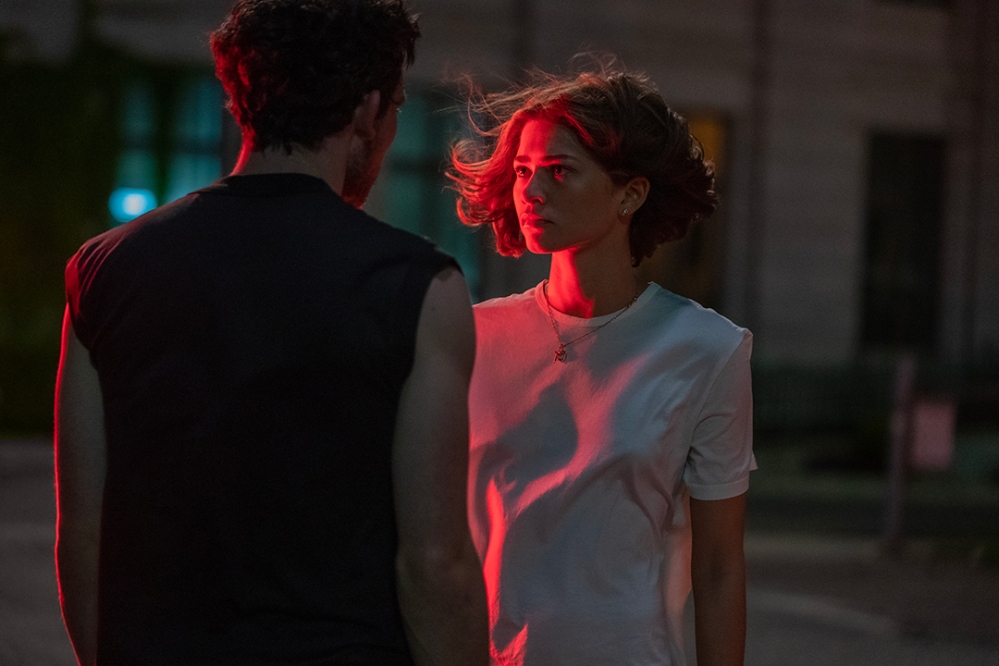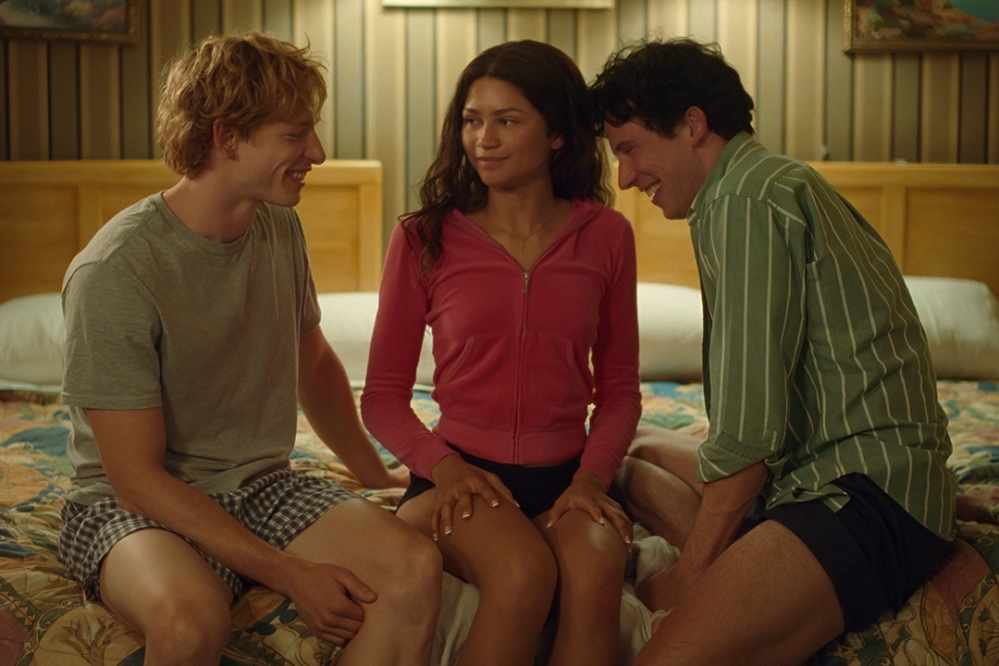If love is a battlefield, it’s fitting that Challengers orients itself around a tennis court. More than any other sport, tennis is deeply intimate (combat sports don’t count, as that’s as close as modern audiences will get to watching a legitimate gladiator match). The bodies in motion, the racket is a physical extension of oneself, and the high-level execution of a simple concept — there’s a lot to get romantic about in the sport. Of course, it’s fertile land to mine within the confines of a drama.
Directed by Luca Guadagnino and written by Justin Kuritzkes, Challengers is exceedingly simple in its premise: Tashi Duncan (Zendaya), a tennis prodigy turned coach in the wake of a career-ending injury, must face her past when her husband Art (Mike Faist) plays his old best friend, Patrick (Josh O’Connor) — and her former boyfriend — in the wake of a losing streak.
Much like that little fuzzy neon ball itself, the film volleys back and forth through time as viewers learn more about the dynamics of the trio’s intertwined and serpentine-like relationship. Challengers starts in the early days, with Tashi’s wunderkind reputation proceeding her as Art and Patrick happen to catch one of her matches during a tournament weekend. A few months out from attending Stanford, alongside Art, on an athletic scholarship, she’s already signed to Adidas, with the brand set to throw her an extravagant soiree later that evening. Keen to manifest some destiny, the two lads find her at the party in hopes of winning her affection. The timeline jumps forward again, this time to their collegiate days, with Tashi dating Patrick ahead of her injury and then vaulting forward again to the weeks and days leading up to the face-off between Art and Patrick — with Tashi caught in the middle of the court from both a literal and metaphorical position.
Like Tashi herself, Challengers sits in the middle — but of two different genres: the thorny relationship drama and the thrilling sports drama. Your mileage may vary on which half connects more thoroughly. Where the film sings, in my estimation, is on the sporting side. Not since Everybody Wants Some!! has a movie accurately rendered the absolute commitment driven athletes have to their competitive spirit. An early match shows Tashi dismantling her opponent in such a clinical fashion that it’s no wonder why Art and Patrick are already obsessed with her. It’s not only her prowess but also how she strives for something otherworldly and spiritual that stands out in her play. Zendaya is electric here, proving why she’s one of our best new talents as she dives into Tashi’s endlessly complex and complicated nature in her younger years. That competition comes out in little moments, too, like how Art and Patrick jockey amongst one another in their mutual pursuit of Tashi. To wit, a particularly painful slap inflicted upon one of the boys will likely cause members of the male viewership to yelp out in gleeful horror during the film.
What’s less effective is the relationship drama — especially when Guadagnino turns his eye to rendering the events of the trio leading up to the rematch between the boys. Tashi’s motivations during the latter portion of the timeline become increasingly harder to track, even as she proclaims she’s “taking such good care of my white boys.” Most of Kuritzkes’ script in this stretch doesn’t do Zendaya any favors, as the rendering of Tashi here ultimately results in a vibe akin to an “I’m playing both sides, so I always come out on top” mentality from It’s Always Sunny in Philadelphia. Considering the depth and nuance afforded to Tashi during her young years, this stretch feels ported in from a different film altogether. It doesn’t service her talents as a performer very well. Is she playing these men against one another for herself to chase this high she can no longer have? Is she trying to make Art better? Is it some secret third thing? There’s a difference between making something opaque for a richer thematic interpretation and obfuscating something for the sake of being ambiguous — and it’s the latter instead of the former. As a result, it also makes Zendaya a third banana in her own story in favor of Art and Patrick’s arcs. While Faist and O’Connor (who is excellent in this stretch as a tremendous dirtbag) are endlessly compelling here, it’s frustrating to see Zendaya draw the short straw.

For a movie that should feel overwhelmingly intimate and, well, sexual, Challengers is shockingly restrained. Those hoping that the film won’t shy away from going there during the teased hotel encounter from the trailer will find plenty to get hot and bothered over, but that’s the only moment in the film that comes close to cashing a previously written check. That’s to say nothing of the ending that nearly earns its euphoric moment of triumph before being immediately undercut by the lack of groundwork to earn it. It’s more of a callback instead of a thematic payoff, a frustrating factor given how strong Guadagnino’s direction is throughout the rest of the film. Bolstered by Trent Reznor and Atticus Ross’ best score since The Social Network, the bravado filmmaking on display during the tennis sequences can only be described as Guadagnino going Sicko Mode; I wouldn’t dare spoil how exhilarating it is to see how he moves the camera during the intensity of the match’s various rounds.
Challengers is entertaining, but it’s a good movie instead of a potentially great one. As Tashi acknowledges herself, pursuing something otherworldly or superlative is difficult and sometimes nearly impossible. Aiming for the moon and falling amongst the stars is a worthwhile legacy, sure, but it’s not a fate befitting someone with a killer instinct. We were so close.

